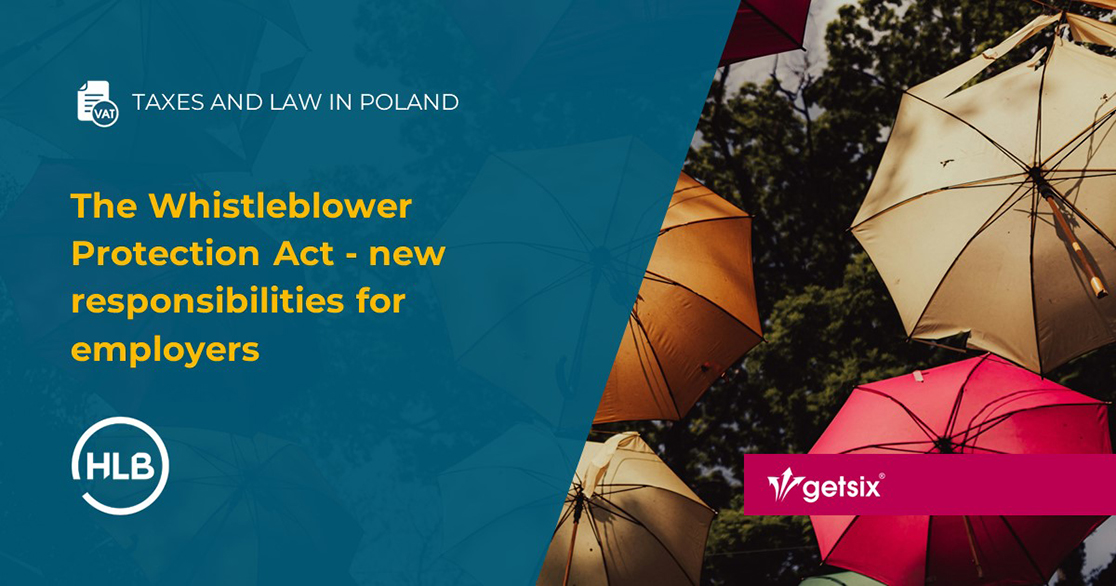The Whistleblower Protection Act – new responsibilities for employers
26 June 2024
26 June 2024

On June 24, 2024, the Whistleblower Protection Act was published in the Journal of Laws, aligning Polish legislation with Directive (EU) 2019/1937 of the European Parliament and Council dated October 23rd, 2019, concerning the protection of individuals reporting breaches of EU law.
Directive (EU) 2019/1937
The European Parliament and Council Directive (EU) 2019/1937, commonly known as the Whistle-blower Protection Directive, was adopted to establish common standards for protecting individuals reporting breaches of EU law. The directive aims to enhance whistle-blower protection across the European Union, promote transparency and integrity in both public and private sectors, and prevent retaliatory actions against those who choose to report irregularities. Its provisions cover a wide range of violations including product safety, environmental protection, public health, consumer protection, and personal data.
The implementation of the Whistle-blower Protection Act in Poland directly results from the necessity to align Polish law with the EU requirements set forth in Directive 2019/1937. The European Union requires that all member states enact legislation protecting whistle-blowers to ensure consistent levels of protection across all member countries. As an EU member state, Poland is obliged to incorporate these provisions into its legal framework.
The new Whistle-blower Protection Act aims to create a safe environment for individuals reporting irregularities.
The Act regulates:
A whistle-blower is a person who reports violations of the law or irregularities in the workplace. Whistle-blowers are individuals who observe actions that are illegal and choose to disclose them. Their role is crucial as they help detect and eliminate unethical or illegal practices.
According to the Act, a whistle-blower can be:
However, to qualify for whistle-blower status and the associated protections, the reporting individual must:
A whistle-blower may report violations of the law involving actions or omissions that are unlawful or aimed at circumventing the law. This includes areas such as corruption, public procurement, services, financial products and markets, money laundering and terrorism financing, product safety and its’ compliance, transportation safety, environmental protection, radiological protection and nuclear safety, food and feed safety, public health, consumer protection, privacy and personal data protection, network and information system security, interests of the State Treasury, local government units, and the European Union’s internal market, including competition and state aid rules, and corporate taxation, as well as constitutional freedoms and human and civil rights.
The Act does not cover information protected by regulations on classified information, or other information not subject to disclosure due to public security concerns, professional secrecy of medical and legal professions, secrecy of judicial deliberations, and criminal proceedings, including secrecy of pre-trial proceedings and closed court hearings.
For a whistle-blower’s report of irregularities to be effective and protected, they must adhere to specified procedures.
A whistle-blower can report breaches of the law through:
A whistle-blower may face reprisals after reporting irregularities, which is why ensuring their protection is essential. The Act aims to safeguard whistle-blowers from retaliatory actions such as job loss, harassment, lack of promotion, rewards, or bonuses.
The Act stipulates that a whistle-blower who has suffered retaliatory actions may seek compensation or damages not less than the amount of the average monthly salary in the national economy in the previous year.
It is also important to consider the rights of individuals who suffer harm due to intentional reporting or public disclosure of false information by a whistle-blower. Such individuals have the right to claim compensation or damages for violations of their personal rights by the whistle-blower who made such a report or public disclosure.
The new Whistle-blower Protection Act imposes several obligations on employers to ensure effective protection of whistle-blowers and promote a culture of transparency in the workplace.
One of the key obligations of employers is to implement appropriate internal procedures that enable whistle-blowers to report irregularities in a safe and effective manner. These procedures should be clearly defined, easily accessible to all employees, and provide mechanisms to protect the whistle-blower’s identity. Employers must ensure that all employees are aware of the existence of these procedures and know how to use them.
The implementation of effective internal procedures also includes defining appropriate communication channels and the possibility of anonymously reporting irregularities through specially prepared forms or platforms.
Internal reporting procedures should specify, among other things:
The obligation to establish internal reporting procedures will apply to:
The Act will enter into force three months after its publication date, i.e., from September 25, 2024, onwards. However, provisions concerning external reporting will enter into force six months after the publication date.
If you have any further questions or require additional information, please contact your business relationship person or use the enquiry form on the HLB Poland website.
***
Download the brochures providing general information and outlining the services that are offered by HLB member firms.
Learn moreClick below for more detailed information regarding population, major towns and cities, language, religion and holidays in Poland.
Learn more